剑指架构师系列-持续集成之Maven实现项目的编译发布和部署
Posted
tags:
篇首语:本文由小常识网(cha138.com)小编为大家整理,主要介绍了剑指架构师系列-持续集成之Maven实现项目的编译发布和部署相关的知识,希望对你有一定的参考价值。
Maven组织项目进行编译、部署
Maven项目基本的结构说明如下:
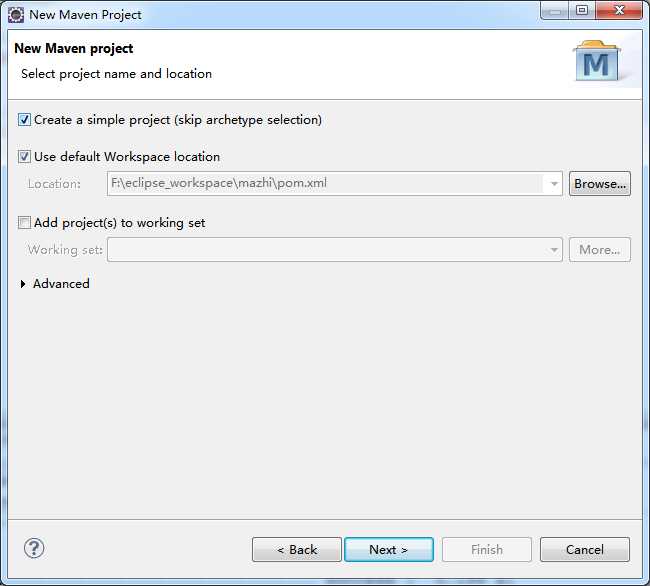
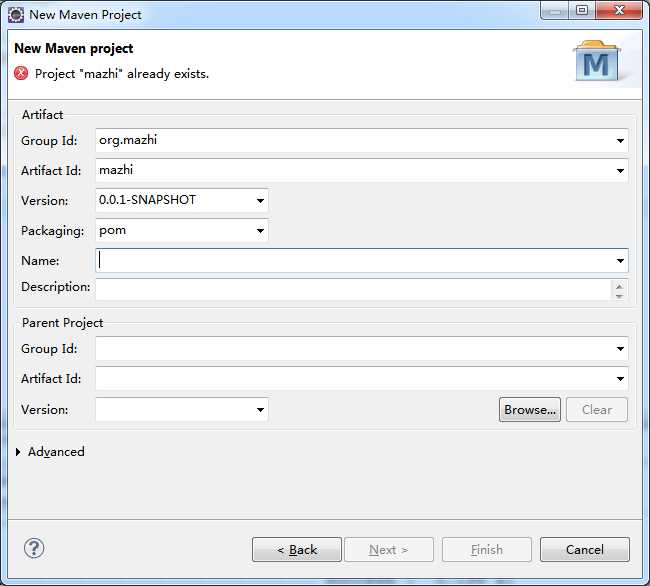
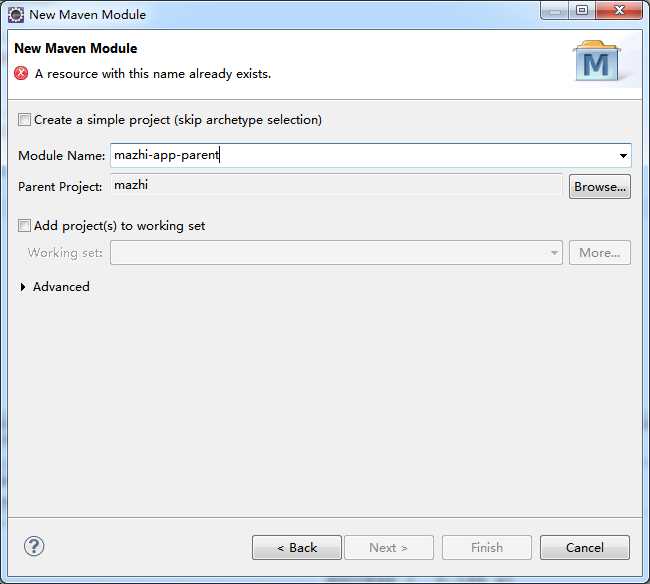
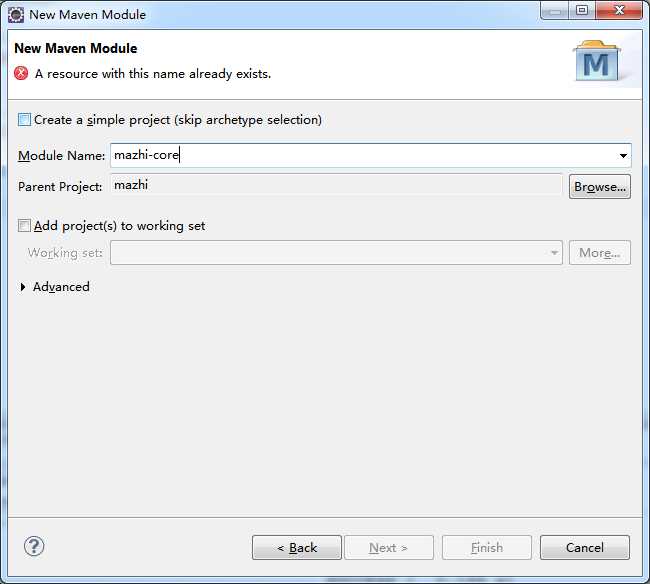
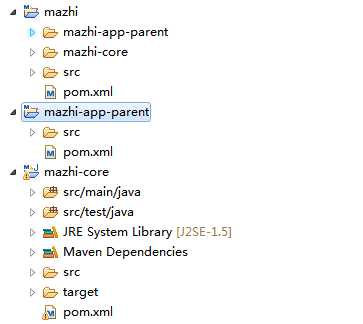
<parent>
<groupId>org.mazhi</groupId>
<artifactId>mazhi-app-parent</artifactId>
<version>0.0.1-SNAPSHOT</version>
<relativePath>../mazhi-app-parent</relativePath>
</parent>
注意添加relativePath节点。

|----src
| |----main
| | |----java ——存放项目的.java文件
| | |----resources ——存放项目资源文件,如spring boot, hibernate配置文件
| |----test
| | |----java ——存放所有测试.java文件,如JUnit测试类
| | |----resources ——存放项目资源文件,如spring boot, hibernate等配置文件
|----target ——项目输出位置
|----pom.xml ----Maven的配置文件
<?xml version="1.0"?>
<project xmlns="http://maven.apache.org/POM/4.0.0" xmlns:xsi="http://www.w3.org/2001/XMLSchema-instance"
xsi:schemaLocation="http://maven.apache.org/POM/4.0.0 http://maven.apache.org/maven-v4_0_0.xsd">
<modelVersion>4.0.0</modelVersion>
<!-- 项目的父项目 -->
<parent>
<groupId>org.mazhi</groupId>
<artifactId>mazhi-app-parent</artifactId>
<version>0.0.1-SNAPSHOT</version>
<relativePath>../mazhi-app-parent</relativePath>
</parent>
<!-- groupId: groupId:项目或者组织的唯一标志,并且配置时生成的路径也是由此生成, 如com.mycompany.app生成的相对路径为:/com/mycompany/app -->
<groupId>org.mazhi</groupId>
<!-- artifactId: 项目的通用名称 -->
<artifactId>mazhi-core</artifactId>
<!-- packaging: 打包的机制,如pom, jar, maven-plugin, ejb, war, ear, rar, par -->
<packaging>jar</packaging>
<!-- version:项目的版本 -->
<version>SNAPSHOT-0.0.1</version>
<!-- 项目的名称, Maven 产生的文档用 -->
<name>Mazhi Core</name>
<!-- 哪个网站可以找到这个项目,提示如果 Maven 资源列表没有,可以直接上该网站寻找, Maven 产生的文档用 -->
<url>http://mazhi.org</url>
<!-- 项目的描述, Maven 产生的文档用 -->
<description>A maven project to study maven.</description>
<!-- 用于配置分发管理,配置相应的产品发布信息,主要用于发布,在执行mvn deploy后表示要发布的位置 -->
<distributionManagement>
<repository>
<id>nexus-releases</id>
<url>http://ip:端口/nexus/content/repositories/releases/</url>
</repository>
<snapshotRepository>
<id>nexus-snapshots</id>
<url>http://ip:端口/nexus/content/repositories/snapshots/</url>
</snapshotRepository>
</distributionManagement>
<!-- 依赖关系 -->
<dependencies>
<!-- 自动加入的依赖包,它们是通过项目坐标来找到依赖包的。所以用了maven之后就不需要再拷jar包了 -->
<dependency>
<groupId>junit</groupId>
<artifactId>junit</artifactId>
<version>3.8.1</version>
<!-- 依赖的范围:默认为compile -->
<!-- test:测试范围有效。即编译和打包时不会加入该依赖包 -->
<!-- compile:编译范围有效。即编译和打包时会将该依赖包一并加入 -->
<!-- provided:编译和测试时有效,最后生成war包时不会加入该依赖包。比如web容器本身已包含的servlet-api.jar,再打包则会冲突 -->
<!-- runtime:运行范围有效,编译时则不依赖 -->
<scope>test</scope>
<!-- <exclusions><exclusion></exclusion></exclusions> -->
<!-- - exclusions表示只包括指定的项目,不包括相关的依赖。试想一下,两个三方jar依赖不同版本的日志包jar,项目会知道应该使用哪个吗?答案是否定的 -->
</dependency>
</dependencies>
</project>
微服务开发之Spring Boot
<properties>
<!-- 表示项目根目录 -->
<main.basedir>${basedir}/..</main.basedir>
<java.version>1.7</java.version>
<spring.version>4.1.4.RELEASE</spring.version>
<hibernate.api.version>1.0.1.Final</hibernate.api.version>
</properties>
<dependencyManagement> <dependencies> <dependency> Import dependency management from spring boot <groupId>org.springframework.boot</groupId> <artifactId>spring-boot-dependencies</artifactId> <version>1.2.1.RELEASE</version> <type>pom</type> <scope>import</scope> </dependency> </dependencies> </dependencyManagement>
这样子模块就可以引用这些属性。
在mazhi-app-parent项目中,配置spring boot集成maven的插件,如下:
<!-- 安装spring boot集成Maven的插件 --> <build> <plugins> <plugin> <groupId>org.springframework.boot</groupId> <artifactId>spring-boot-maven-plugin</artifactId> </plugin> </plugins> </build>
在mazhi-service模块中引入Spring boot的包,如下:
<!-- Add typical dependencies for a web application -->
<dependencies>
<dependency>
<groupId>org.springframework.boot</groupId>
<artifactId>spring-boot-starter-web</artifactId>
</dependency>
</dependencies>
在 org.mazhi.service包中新建Application.class类,内容如下:
package org.mazhi.service;
import org.springframework.boot.SpringApplication;
import org.springframework.boot.autoconfigure.EnableAutoConfiguration;
import org.springframework.stereotype.Controller;
import org.springframework.web.bind.annotation.RequestMapping;
import org.springframework.web.bind.annotation.ResponseBody;
@Controller
@EnableAutoConfiguration
public class Application {
@RequestMapping("/")
@ResponseBody
String home() {
return "Hello World!";
}
public static void main(String[] args) throws Exception {
SpringApplication.run(Application.class, args);
}
}
添加Spring boot的配置文件,放到java/main/resource下,内容如下:
# Server settings (ServerProperties)
server:
port: 8090
sessionTimeout: 30
# contextPath: /
# Tomcat specifics
tomcat:
accessLogEnabled: false
protocolHeader: x-forwarded-proto
remoteIpHeader: x-forwarded-for
basedir:
backgroundProcessorDelay: 30 # secs
management:
address: 127.0.0.1
port: 8090
info:
app:
name: springtest
description: spring test
version: 1.0.0
注意缩近和格式,不要随便做对齐什么的操作,这是一种约定。
在这个类上右键,Run As >> Java Application,可以看到Eclipse的控制台输出如下信息,表示启动成功!!

可以用浏览器去访问一下这个服务,地址为:
http://localhost:8090/
浏览器会输出:
Hello World!
<dependency> <groupId>org.mazhi</groupId> <artifactId>mazhi-core</artifactId> <version>0.0.1-SNAPSHOT</version> </dependency>
如果这时候没有对mazhi-core进行build和instaling过程时,可能会报错,需要对mazhi-core模块install一下,然后进行引入即可。
Maven项目有时候本身没错,但是项目名上显示红叉,这时候只要更新一下项目即可。
项目上右键 >> Maven >> Update Project .. 即可。
或者还报错的话,需要先运行mazhi项目下的pom.xml文件,install一下,保证几个子模块成功进行了build和installing过程。
以上是关于剑指架构师系列-持续集成之Maven实现项目的编译发布和部署的主要内容,如果未能解决你的问题,请参考以下文章